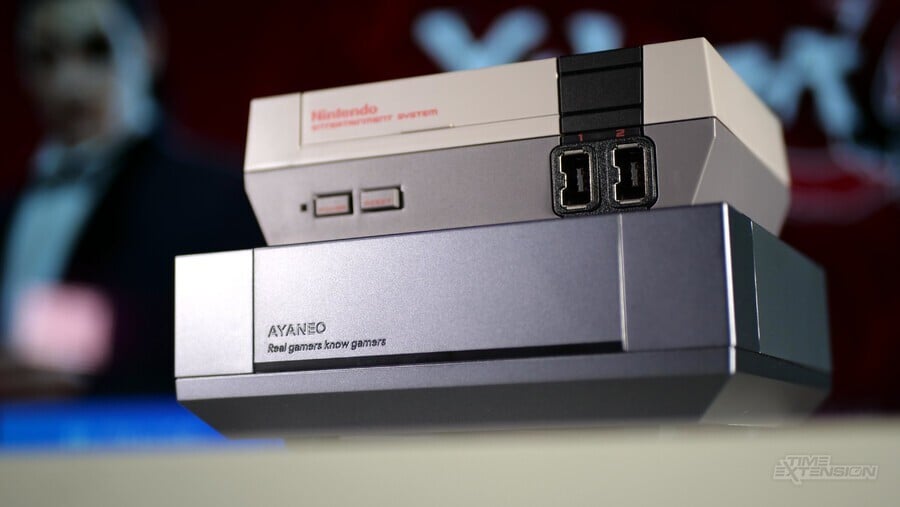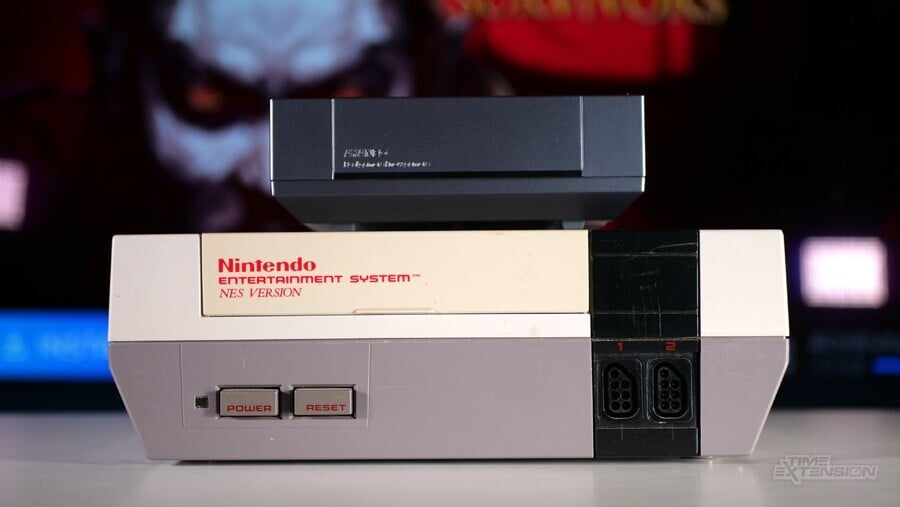
AYANEO's 'Remake' line of products includes the AM01 Retro Mini PC and Slide handheld so far, but the company has just added to the range with the Retro Mini PC AM02 – another dinky personal computer which takes its design inspiration from the Nintendo Entertainment System.
Like other devices in the series, the Retro Mini PC AM02 is intended to mix old and new in a fetching fusion – and the headline story is its built-in 4-inch touchscreen display. Does this make it worth a look over the cheaper (and less powerful) AM01, though? Let's find out...
AYANEO Retro Mini PC AM02 Review: Design & Display
AYANEO has been very clear about the Retro Mini PC AM02's influences when it comes purely to design – the system is a dead ringer for the NES, right down to the flap at the front, which pops up to reveal additional USB ports and a 3.5mm headphone socket. Even the overall shape of the system calls to mind Nintendo's 8-bit console, making this one of the most attractive mini PCs on the market.
The red button on the upper-left corner of the AM02 activates the aforementioned pop-up flap, while the button on the opposite edge turns the device on; it also illuminates when the AM02 is in action. Round the back, you've got a plethora of ports on offer, including two standard USB ports, Displayport 1.4, HDMI 2.0, 1Gbps and 2.5Gbps LAN ports and a USB-C power socket.
However, the most notable feature of the AM02's external design is the 4-inch LCD touchscreen on the top. The idea is that this display will allow you to see important information such as the current FPS, TDP, fan speed and much more – stuff that, ordinarily, you'd have to have as an on-screen performance overlay. You can even interact with certain elements, adjusting them on the fly. Swiping the screen reveals a second set of information related to the date, time and local weather, while another swipe allows you to control the overall system volume and turn off the LCD screen entirely if you find it too distracting.
AYANEO is keen to stress that this aspect of the AM02 is still very much in development, and what's present in this pre-production review model shouldn't be considered final. The touch response is quite laggy (this will be remedied in future software updates), and the stats screen is very buggy; for example, after the initial boot, it displayed the FPS as being '-1' for a few days before reverting to the correct number. The proposed personalised screensavers also aren't available as yet (these are presumably going to be included to avoid the issue of screen burn-in).
However, we're willing to cut AYANEO some slack here, as this isn't the final version of the software – and it has a relatively good track record when it comes to updates to its AYASpace platform (a proprietary software layer which is used across the vast majority of its products). The concept is a sound one in principle; being able to view system information quickly and even toggle it without having to dig into your PC's settings menu is a great idea, and one we can really get behind; a gimmick this isn't.
AYANEO Retro Mini PC AM02 Review: Specs & Performance

The AM02 is available in the following configurations, all of which are up for pre-order on IndieGoGo as we speak:
| CPU | RAM / Storage | Early Bird Price | Price |
|---|---|---|---|
| AMD Ryzen 7 7840HS | Barebone | $439 | $499 |
| AMD Ryzen 7 7840HS | 16G + 512G | $529 | $659 |
| AMD Ryzen 7 7840HS | 16G + 1TB | $569 | $699 |
| AMD Ryzen 7 7840HS | 32G + 1TB | $629 | $769 |
The version of the AM02 we were sent is packing an AMD Ryzen 7 7840HS processor alongside an AMD Radeon 780M GPU, as well as 32G RAM and 1TB of storage. That's a pretty robust setup for a device of this size and stature, and it places it in a ballpark similar to handheld PCs like the AYANEO Slide.
Naturally, because the AM02 isn't portable and doesn't have to worry about conserving battery power, you can run it at full speed, boosting the TDP and cranking up the internal fan to ensure maximum performance.
If you've got an existing Steam library – or you're subscribed to Xbox Game Pass – then you'll going to have plenty of titles to test out on this device. During our review period, we found AAA games like Elden Ring, Cyberpunk 2077 and Devil May Cry V all ran brilliantly in 1080p with close-to-maximum visual settings, and, in some cases, we were able to boost the resolution and still achieve solid frame rates. We're not talking total parity with PS5 and Xbox Series X here, however, so don't expect the same silky-smooth graphics you'd see on those dedicated systems.
Another thing to note is that, due to its small size and high power level, the AM02 gets awfully noisy when you're playing really demanding games. While you can adjust the fan speed using the touch display, there's no getting around the fact that the Ryzen 7 7840HS is generating a lot of heat when it's running at full pelt, and the only way to mitigate that is to use a powerful internal fan.
As ever, we put the AM02 through its paces when it comes to emulation as well, and it passed with flying colours. It's possible to emulate right up to the PS3, running at close to full speed with only minor visual issues. Anything prior to that will run almost flawlessly, and thanks to the fact that the PC emulation community is so well supported, practically every vintage system will have an emulator available. Installing RetroArch helps take the effort out of getting everything set up, too. The price might make this an unlikely option when it comes to an all-in-one retro system, but it's a nice bonus to have if you're also going to use it for light-to-medium work tasks and modern-day gaming.
AYANEO Retro Mini PC AM02 Review: Conclusion
We'd never suggest that you should buy a PC purely on the way it looks, but there's no denying that the AM02 is sleek and adorable, and channels just the right amount of NES energy to make it stand out on your desk. The 4-inch touchscreen isn't quite the finished article yet, but it has the potential to make this mini PC even more interesting in the long term.
As is the case with practically every AYANEO product, price is likely to be a sticking point for some; the company prides itself on creating premium devices and the Retro Mini PC AM02 certainly feels like one. For the cost of the top-level model ($629 early bird, $769 standard) you could pick up a decent full-size desktop PC which might not look as nice, but would offer more bang-per-buck – but that's perhaps missing the point of the AM02. This is a compact and highly portable computer which can handle AAA games, medium-level work tasks and much more besides, and it's meant to look eye-catching even when it's turned off.
As we said with the AM01, the Retro Mini PC AM02 isn't going to be for everyone. Some people might want the same kind of functionality but in a portable, Steam Deck-style form factor, and AYANEO (as well as its rivals) has you covered in that regard (often for an additional cost, it must be stressed – its Slide handheld costs over $1000). Others might crave more power in their desktop PC, and would be advised to look elsewhere for something beefier in terms of both size and internals. However, the success of the AM01 has proven there's a viable market for super-small PCs which not only fit effortlessly into the most minimalist of setups, but are also easy to carry around but still have the right amount of processing muscle to cover your needs – and look pretty to boot.
The Retro Mini PC AM02 ticks all of those boxes, even if the price is likely to be a barrier for some people.
Thanks to AYANEO for supplying the Retro Mini PC AM02 used in this review.
